Spousal Dementia Caregiver Stress and the Risks of Cognitive Decline for The Caregiver
cIn research comparisons between non-dementia caregivers and dementia caregivers, indications show that spousal caregivers of persons with dementia experience greater cognitive decline than non-dementia caregivers.1 Studies abound citing the caregiver stress experienced by all types of caregivers and the subsequent and related health concerns that occur in addition to the level of denial by caregivers of the importance of self-care.
Many caregivers simply refuse to care for themselves. They caregive to a fault and to a point of exhaustion until something happens to cause the caregiver to pay attention to his or her own health. Unfortunately, for a caregiver to pay attention to health, it takes a “wake up call” like a serious change in health.
Caregivers fail to consider who will care for their loved one if they are unable to provide care. They also feel extreme responsibility, feel pressure from the care recipient or other family members to provide care, and experience significant guilt about the duty to provide care.
According to the Family Caregiver Alliance2, 57% of caregivers report that they do not have a choice about performing clinical tasks, and that this lack of choice is self-imposed. 43% feel that these tasks are their personal responsibility because no one else can do it or because insurance will not pay for a professional caregiver.
12% report that they are pressured to perform these tasks by the care receiver.
8% report that they are pressured to perform these tasks by another family member. [AARP and United Health Hospital Fund. (2012). Home Alone: Family Caregivers Providing Complex Chronic Care.]
Many caregivers hold out with the expectation or hope that caregiving will not be a long-term situation. This belief is more accurate for non-dementia caregivers than spouses caring for a loved one with dementia.
On average caregiving lasts between 1-4 years. Twenty four percent of caregivers caregive for 5 or more years. This time frame is more common for caregivers of a person diagnosed with dementia. Fifteen percent of caregivers remain in this role for 10 or more years.2
A significant difference exists between caregivers with greater financial resources and assistance. Higher levels of social support, coping skills, income to pay for care, positive self-care, and good health results in lower levels of stress on the caregiver.
Caregivers who are older, age 65+, and who are already vulnerable with to diagnosed chronic diseases fare worse in general due to the stress of caregiving even if the above identified supports are available. Individual differences play a role in how each person responds to the role of caregiving.
The Health and Retirement Study1 specifically examined caregivers in two situations: caregiving during the life of the care recipient and post death. The study indicates that overall declines in health and well-being continue after the death of the loved one. Chronic stress related to being a dementia caregiver results in an acceleration of increase in frailty (a decline in physical, emotional, and cognitive abilities) compared to non-dementia spousal caregivers. The differences in cognitive health extend on average, 2 years following the cessation of care responsibilities. With the majority of dementia caregivers being women, this is of significant concern because older women are a group that is already at high risk of developing Alzheimer’s disease without the additional stressors of being a dementia caregiver.
The negative outcomes of being a caregiver are well known. Spousal caregivers, and all caregivers, especially caregivers for persons with dementia are especially vulnerable. The important of identifying supports for care cannot be underestimated so that the health and well-being of the caregiver is not compromised.
1 Dassel, K.B. et al. Does Caring for a Spouse with Dementia Accelerate Cognitive Decline? Findings from the Health and Retirement Study. Gerontologist 2017, Vol 57, No. 2, 319-328. Doi: 10:1093/geront/gnv148
2 Family Caregiver Alliance: https://www.caregiver.org/caregiver-statistics-demographics. Retrieved 11/5/17.
©2017 Pamela D. Wilson. All Rights Reserved.
Return to the Memory Loss & Alzheimer’s Category Page
Check Out The Caring Generation Podcasts for More Answers to Questions Caregivers Ask

Looking for a Roadmap to Care for Aging Parents? Check out Pamela’s Online Course


